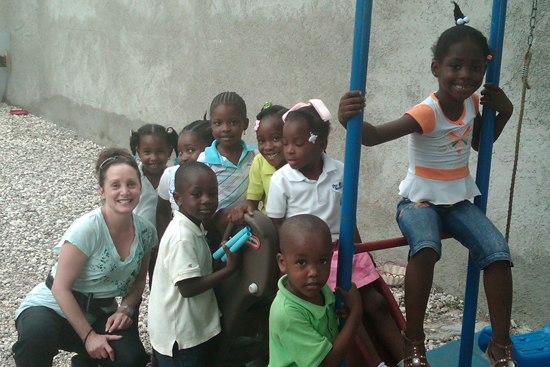A Voice for the Disenfranchised
SAR alum Andrea Capachietti speaks up for women, children in crisis

When she arrived at the children’s home in Romania, Andrea Capachietti (CGS’75, SAR’77) found infants and toddlers tethered to their cribs, being force-fed with syringes of porridge. The children were rarely held or touched, and Capachietti—part of a humanitarian aid team assessing caretaking practices at Romanian orphanages in the early 1990s—instantly recognized they were suffering from sensory deprivation, which can have severe neurological and psychological ramifications.
“I was horrified,” says the occupational therapist and pediatric health educator, but she soon realized the treatment was not deliberate abuse. “This was largely a result of a lack of staff and lack of training. The orphanages were trying to balance a huge ration of kids to too few caretakers.”
What struck Capachietti most about the situation was that these children had no advocates to insist on better care. “There was no one to represent these kids—no families, and really no one from the state,” she says. The visit to Romania was among Capachietti’s early forays into overseas humanitarian aid work, and the experience shaped her decision to build a career in advocacy, raising her voice for women and children who are often the silent victims of conflict and crisis.
Since then, she has traveled to the Balkans to assess the needs of hospitals and to find homes for war orphans. She’s visited Rwanda to educate women about their reproductive rights and Guatemala to help sex workers gain access to health care. At home in Los Angeles, she has lectured at local universities, served on the advisory board for the local chapter of the International Criminal Court Alliance, and consulted for Children of the Night, a nonprofit that rescues children and teens from prostitution.
Capachietti discovered her passion for humanitarian work during her years at BU. A longtime athlete with an interest in law, she was planning to become a sports attorney, negotiating contracts for professional athletes. Then her three-year-old cousin was diagnosed with a brain tumor, and when Capachietti visited the little girl at Children’s Hospital Boston, she was surprised to see kids from all over the world receiving treatment there. She had never before realized how hard it was for many of the world’s children to receive quality medical care.
“I wanted to know why these treatments and services weren’t available everywhere,” she says, “and I wanted to understand more about the health professionals who were treating my cousin and the other children.”
Her curiosity led her to change her focus from law to occupational therapy, and she immediately found that Sargent College’s wealth of practicums and internships perfectly suited her personality. “I had way too much energy sometimes to sit in a classroom,” she says.
Capachietti earned a master’s degree in special education at the University of Southern California and then began a clinical career in California hospitals. She eventually became unsatisfied, however, with “the clinical setting of four walls and endless paperwork.” Sensing that her true calling lay in the field of global health, she enrolled in a doctoral program in education policy and began working for international aid agencies.
Among her first humanitarian trips abroad was a visit to Sarajevo in the former Yugoslavia, where she found herself helping with medical evacuations for children with acute illnesses. “I discovered that I thrived in a little bit of chaos,” she says.
Another lesson she’s learned in her global aid work is the importance of respecting local culture. “The first impression you make on someone in disaster and conflict is often the only impression you make,” she says. If aid workers aren’t sensitive to local customs, they risk alienating the very people they’ve come to help, turning them off from receiving any kind of assistance.
Today, Capachietti juggles on-the-ground humanitarian aid work with teaching and lecturing, fundraising for disaster relief, consulting with nongovernmental organizations and foundations, and receiving postdoctoral training in global health, international development, and human rights.
During a recent lecture to students at Sargent College, Capachietti told the audience that she is shaping the next chapter of her career around the need to support women in their role as nation builders. She told the story of meeting a South African woman who was soon to become a Zulu chief—a rare position for a woman. The future chief spoke to a class Capachietti was teaching. “She told my students the following: ‘When the status and power of women are higher, so too is the quality of life in that nation.’ I emphatically agree.”
In many parts of the world, becoming a leader is challenging and risky for women, Capachietti says, but the results can be “amazing.” In her work with the nonprofit Women for Women International, for example, she has seen microfinance programs provide loans that lift women into self-sufficiency, and then seen those women lift their communities. This type of indirect aid is often the most powerful, she says. “Over and over in every aspect of my work, we prove that educating people to find resources—to educate themselves—helps them develop their own systems of recovery and self-worth.”
Corinne Steinbrenner can be reached at cks@bu.edu.
A version of this article originally appeared in the 2011 edition of Sargent Impact.
Comments & Discussion
Boston University moderates comments to facilitate an informed, substantive, civil conversation. Abusive, profane, self-promotional, misleading, incoherent or off-topic comments will be rejected. Moderators are staffed during regular business hours (EST) and can only accept comments written in English. Statistics or facts must include a citation or a link to the citation.